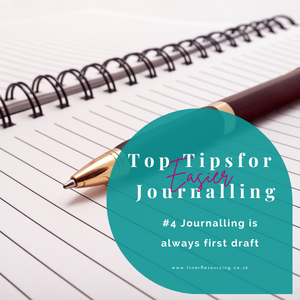8+ Tested Tips For Easier Journalling about Your Career
Wondering how to get going with journalling for career change? Here are some helpful ideas and practical, straight-away-actionable tips to get round writer’s block, the terror of the blank page, and other journalling problems.
These are especially useful for those finding it hard to get started, or to keep going with a journal practice.
(Looking for journalling prompts around career change? Find them here… )
So you want to journal about your career
You know you need a way of tuning into yourself and figuring out what you really want. You’ve reached that point in your life and your career where you know you want something different.
SOMETHING has to change.
And you’ve heard journalling can be an effective and fun way of figuring it all out.
But you just can’t get started with it.
Because life is SO busy. And you spend every waking hour thinking about work, thinking about your to-do list, trying to fit in something healthy… So you keep procrastinating, even though you’ve bought the pretty notebook and fancy gel pens.
And worse, when you DO find the time to sit down and think about your career and what you want from it, your mind goes blank.
Where on earth do you start?
HOW do you start?
Don’t panic. I used to struggle with journalling too
When I trained as a counsellor, keeping a written, self-reflecting record of my journey was one of the requirements. Prior to this I’d had a go at journalling on and off for a number of years, but to be honest it had mostly been off!
But now I had to figure out how to get past the procrastination and actually write consistently.
More recently the dynamic, embodied writing practice called “Thinking at the Edge” has led me to deeper written exploration of my work with women who are finding themselves in their 50s and wanting career fulfilment.
Now I write regularly and it’s an integral part of both my self development and my professional development practices.
Here are some things I’ve learned about writing for career and self discovery that might also help you:
Some principles and 8+ tips for easier journalling about your career (or anything else)
for those finding it hard to get started, or keep going
0. Why journalling matters
I originally had this last, but it’s really the foundation to all of this. So maybe this needs to be Principle Zero. The reason that putting your thoughts, ideas, feelings, experiences, desires, fires, tangles, and inspirations into words is so important.
This came to me in the course of my own journal writing:
What wants to be said is what wants to be lived.
Our relationship with words and language is remarkable. Words allow us to refer (and refer back) to moments of inner clarity and a grasp of something in there that might otherwise be lost. Journalling (like good coaching or therapy) helps you hear, see, and live your inner world in a way that helps you transmute potentially transient insight and discernment into something you can unfold and from which you can grow.
1. Sidestep the blank page
A blank page can be daunting. What to say? Or maybe there’s so much to say about work and career and everything that goes around it. You don’t know where to start.
So don’t begin with a blank page.
Try writing out a favourite quote first. Then write about what you like about it, or what it reminds you of, or what it brings up for you.
Alternatively, start with a prompt. Search online for eg “journal prompts for self-awareness”. Or check out my popular article (23 Proven Journal Prompts to Unlock Your Career Change Success), which has a load of prompts for career change.
Or try starting with this writing prompt:
Writing about my work and career feels……… because………..
2. Journalling is about the journey, not the destination
Journalling is about exploration, not producing a finished piece of writing. A lot of people miss this point because we’re used, from school to college to work, to producing something whole and complete when we write – an essay, a report, an email.
Journalling is not that.
When you journal about your career, allow yourself to write anything you feel like, and any length.
Especially forget “business” writing. Journalling doesn’t have to be complete sentences. And it doesn’t need to make sense (even to you).
If you struggle to get out of the mindset of “it has to be proper sentences and paragraphs”, try:
- turning your page round and writing sideways
- experiment with only writing single words or short phrases then drawing lines of connection between them
- play with writing in a spiral (make it easy by drawing a spiral on your page first so you’ve got a track to follow).
- another way to get out of “grown-up writing” is to write with a crayon and see how that changes what you want to write.
3. No words? No problem!
If you’re sitting there, pen and paper in hand and nothing’s coming, try doodling. Today, just getting your hand moving across the paper, making marks, is enough. No pressure. No expectations. Play with light marks and heavy marks. Scribble. See what kind of doodling feels good.
Or find images that speak to you somehow and paste them in. Then see if you can write about them.
If words then come from either of these, great! If not, also great! You’ve started sensing into something.
4. Embrace the “first draft” nature of journalling
This is the action that finally shifted my procrastination.
Set aside the fancy leather bound journals and purple ink. Grab a biro and any old notebook or even some loose sheets of paper in a ring binder. Start writing here.
You see, I realised I wasn’t writing in my beautiful journal because the stuff that was coming out didn’t feel worthy of it. It wasn’t beautifully worded or constructed. It wasn’t significant enough for the fancy-shmancy notebook.
But journalling is always a first draft. That is actually the point – to get out on paper the uncensored, the immediate, the thing you didn’t even know you were thinking. Also to write the stuff that swills around at the front of your brain all the time, in order that you can then access what’s beneath that.
(And don’t worry, once you get into the swing of it, you can always go back to the fancy stationery.)

A journal (like a good coach) should be ready to hear whatever you want to say. However you want to say it. Your journal is the place to be REAL not instagram-able.
Which brings me to point 6…
5. Forget art. Get real
Do not, repeat, do not look at journaling stuff on Instagram because mostly you’ll see images of insta-perfect, performative journals, where the point is to look creative and artsy. Which is fine – if that’s what you’re after. But you’re after something deeper, no?
It’s mostly about appearance over there and, Goddess knows, we get enough of that everywhere else.
Real life is messy, …coffee-stained, …gritty. You do NOT owe the world pretty and you, for sure, do not owe them pretty in your journal.
6. The “P” word
Sometimes I sit down to write and immediately notice 5 things that need tidying, or remember about that email I was going to send. This is where the “P” word comes into play.
Priority
You don’t need to go big and start beating yourself up about all the ways you prioritise those things that do not lead you to the changes, the self-awareness, or the career fulfilment that you desire.
Just pause. Recognise that you have reached a choice-point and ask yourself one question:
“What do I choose to prioritise for the next 15 minutes?”
NB – Not “today”. Not “this year”. Not “everywhere in my life”. But just for the next 15 minutes.
Permission Slip
Here’s another P word – permission.
I hereby attest that you are permitted to write on any old paper. To write anything and everything. Deep things, beached things, generalities, quotes, wrong words, right-on words, complaints, blessings, swears, prayers, incantations, shopping lists, bucket lists and fuck-it lists, and more, …).
Permission to be poetic if you feel like it. Prosaic if you don’t.
Permission to be present.
Permission to write sideways or diagonally, or any damn direction you please. To cross stuff out, to draw and scribble, and to break all the rules of writing neatly and within the lines that you learned at school.
And if you want to write beautiful copperplate inside the lines, feel free to do that as well.
The only rule for journalling is – there are no rules. Play. Discover what works for you, then do that.
What did you think about these tips for easier journalling?
I’d love to hear how this landed for you. Get in touch here with any comments or questions.
And check out this article for a whole host of career journalling prompts.
Now you’ve got started with writing about your career, you may be finding there’s a lot there that needs thinking about. If you’d like support with your career change, take a look at ways you can work with me here…
